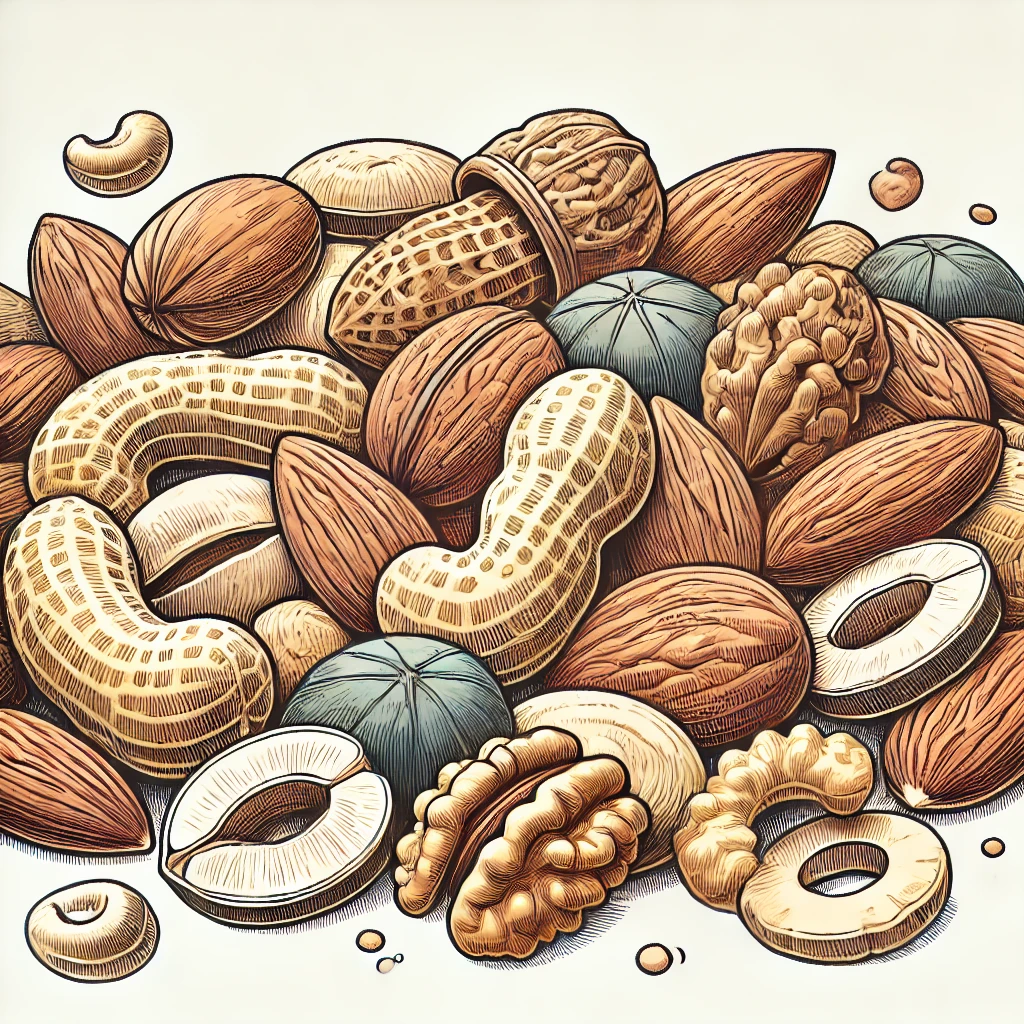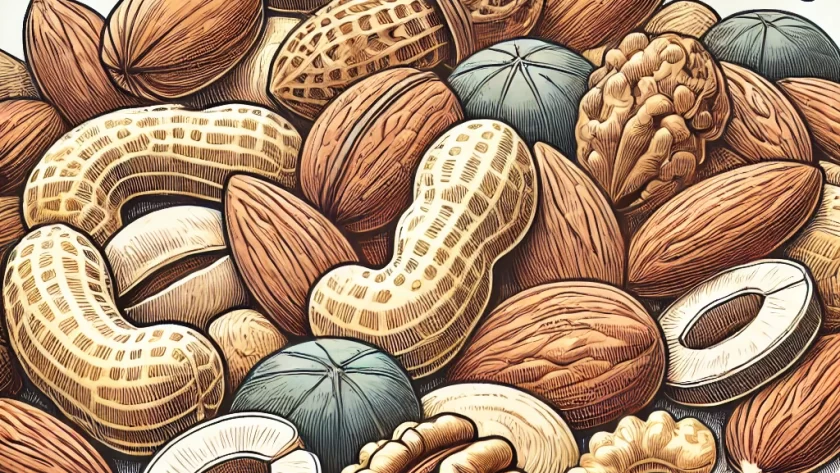ミックスナッツ [Mikkusu Nattsu]
Official髭男dism [Official Hige Dandism]
Words & Music : 藤原聡 [FUJIWARA Satoshi]
Official Hige Dandism is a band formed in Shimane Prefecture wiki and is currently very popular in Japan. Let me briefly explain the band name.
- 髭(ひげ) [hige] : beard
- 男(おとこ・だん) [otoko, dan] : man
Using these words, the original name is written as “Official髭男dism.” It includes a pun, making it seem like a name chosen in a playful manner.

“Mixed Nuts” was created as the opening theme for the first cour of the TV anime “Spy×Family” Season 1. The band members, being fans of the original manga, volunteered to create the theme song when they learned it was being adapted into an anime.
The lyrics were written with the theme of family and the main character Anya’s love for peanuts in mind.
袋に詰められたナッツのような世間では
fukuro ni tsumerareta nattsu no yō na seken de wa
誰もがそれぞれ出会った誰かと寄り添い合ってる
daremo ga sorezore deatta dareka to yorisoiatteru
- 袋(ふくろ) [fukuro] : bag
- 詰める(つめる) [tsumeru] : pack
- ナッツ(なっつ) [nattsu] : nuts
- …のような(のような) [no yō na] : like
- 世間(せけん) [seken] : society
- 誰も(だれも) [daremo] : everyone
- それぞれ [sorezore] : each
- 出会う(であう) [deau] : meet
- 誰か(だれか) [dareka] : someone
- 寄り添う(よりそう) [yorisou] : snuggle
(translation) “In a world like a bag of nuts,
everyone meets someone and snuggles together.”

そこに紛れ込んだ僕らはピーナッツみたいに
soko ni magirekonda bokura wa pīnattsu mitai ni
木の実のフリしながら 微笑み浮かべる
ki no mi no furi shinagara hohoemi ukaberu
- そこ [soko] : there
- 紛れ込む(まぎれこむ) [magirekomu] : slip in
- 僕ら(ぼくら) [bokura] : we
- ピーナッツ(ぴーなっつ) [pīnattsu] : peanuts
- …みたい(みたい) [mitai] : like
- 木の実(きのみ) [ki no mi] : nut
- …のフリをする(のふりをする) [no furi o suru] : pretend to be
- 微笑み(ほほえみ) [hohoemi] : smile
(translation) “We, who slipped in there like peanuts,
pretend to be nuts while smiling.”
The phrase “…no furi o suru / のふりをする” also appeared in yesterday’s “Comedy.”
幸せのテンプレートの上 文字通り絵に描いたうわべの裏
shiawase no tenpurēto no ue mojidōri e ni kaita uwabe no ura
テーブルを囲み手を合わすその時さえ ありのままでは居られないまま
tēburu o kakomi te o awasu sono toki sae arinomama de wa irarenai mama
- 幸せ(しあわせ) [shiawase] : happiness
- テンプレート(てんぷれーと) [tenpurēto] : template
- 上(うえ) [ue] : on
- 文字通り(もじどおり) [mojidōri] : literally
- 絵(え) [e] : picture
- 描く(かく) [kaku] : draw
- うわべ [uwabe] : surface
- 裏(うら) [ura] : back
- テーブル(てーぶる) [tēburu] : table
- 囲む(かこむ) [kakomu] : surround
- 手(て) [te] : hand
- 時(とき) [toki] : time
- さえ [sae] : even
- ありのまま [arinomama] : as it is
- 居る(いる) [iru] : be
(translation) “On the template of happiness, literally behind the surface of the picture,
even when we surround the table and join hands, we cannot be as we are.”
The phrase “surround the table and join hands”, seems to refer to a Japanese pre-meal custom. Before a meal, people join hands and express their gratitude to nature for providing the food. Not every household practices this, but the phrase “itadakimasu / いただきます,” which follows, is a signal to start the meal and is commonly said by all Japanese. It expresses gratitude for the lives sacrificed for the food, as well as appreciation for the person who prepared the meal.

隠し事だらけ 継ぎ接ぎだらけのHome, you know?
kakushigoto darake tsugihagi darake no Home, you know?
噛み砕いても無くならない 本音が歯に挟まったまま
kamikudaitemo nakunaranai honne ga ha ni hasamatta mama
- 隠し事(かくしごと) [kakushigoto] : secret
- だらけ [darake] : full of
- つぎはぎ [tsugihagi] : patchwork
- 噛み砕く(かみくだく) [kamikudaku] : chew up
- なくなる [nakunaru] : disappear
- 本音(ほんね) [honne] : true feelings
- 歯(は) [ha] : tooth
- 挟まる(はさまる) [hasamaru] : get stuck
(translation) “Home is full of secrets, full of patchwork, you know?
True feelings stuck between the teeth, even when chewed up, won’t disappear.”
There’s an idiom “okuba ni mono ga hasamatta yō na / おくばにものがはさまったような,” which means to speak as if something is stuck between the back teeth. It implies speaking in a roundabout or secretive manner.
不安だらけ 成り行き任せのLife, and I know
fuan darake nariyuki makase no Life, and I know
仮初めまみれの日常だけど ここに僕が居て あなたが居る
karisome mamire no nichijō dakedo koko ni boku ga ite anata ga iru
この真実だけでもう 胃がもたれてゆく
kono shinjitsu dake de mō i ga motarete yuku
- 不安(ふあん) [fuan] : anxiety
- 成り行き任せ(なりゆきまかせ) [nariyuki makase] : leaving things to chance
- 仮初め(かりそめ) [karisome] : temporary
- まみれ [mamire] : covered with
- 日常(にちじょう) [nichijō] : daily life
- ここ [koko] : here
- 僕(ぼく) [boku] : I
- あなた [anata] : you
- この [kono] : this
- 事実(じじつ) [jijitsu] : fact
- だけ [dake] : only
- もう [mō] : already
- 胃がもたれる(いがもたれる) [i ga motareru] : to feel heavy in the stomach
(translation) “Full of anxiety, leaving life to chance, and I know.
Though daily life is covered with temporary things, here I am, and here you are.
Just this truth alone already makes my stomach feel heavy.”
The phrase “胃がもたれる / i ga motareru” is sometimes used metaphorically to mean feeling fed up or overwhelmed. If used metaphorically, it can be sarcastic, but the author might have meant to say that they are satisfied.
From here on, I’ll go through it quickly.
化けの皮剥がれた一粒のピーナッツみたいに
bake no kawa hagareta hitotsubu no pīnattsu mitai ni
世間から一瞬で弾かれてしまう そんな時こそ
seken kara isshun de hajikarete shimau sonna toki koso
曲がりなりで良かったらそばに居させて
magarinari de yokattara soba ni isasete
共に煎られ 揺られ 踏まれても 割れない殻みたいになるから
tomo ni irare yurare fumarete mo warenai kara mitai ni naru kara
(translation) “Like a peanut whose shell has peeled off,
instantly rejected by society, at such times,
please let me stay by your side if it’s okay.
Together we will be roasted, shaken, and stepped on, but we’ll become like an unbreakable shell.”
生まれた場所が木の上か地面の中か それだけの違い
umareta basho ga ki no ue ka jimen no naka ka sore dake no chigai
許されないほどにドライなこの世界を 等しく雨が湿らせますように
yurusarenai hodo ni dorai na kono sekai o hitoshiku ame ga shimerasemasu yō ni
(translation) “The only difference is whether you were born on a tree or underground.
May the rain equally wet this unforgivingly dry world.”
時に冷たくて 騒がしい窓の向こうyou know?
toki ni tsumetakute sawagashii mado no mukō you know?
星の一つも見つからない 雷に満ちた日があっても良い
hoshi no hitotsu mo mitsukaranai kaminari ni michita hi ga atte mo ii
ミスだらけ アドリブ任せのShow, but I know
misu darake adoribu makase no Show, but I know
所詮ひとかけの日常だから 腹の中にでも 流して寝よう
shosen hitokake no nichijō dakara hara no naka ni demo nagashite neyō
(translation) “Sometimes it’s cold, beyond the noisy window, you know?
Even if you can’t find a single star, it’s okay to have days filled with thunder.
Full of mistakes, leaving the show to ad-lib, but I know.
It’s just a small piece of daily life, so let’s just swallow it and sleep.”
隠し事だらけ 継ぎ接ぎだらけのHome, you know?
kakushigoto darake tsugihagi darake no Home, you know?
とっておきも出来合いも 残さずに全部食らいながら
totteoki mo dekiai mo nokosazu ni zenbu kurainagara
普通などない 正解などないLife, and I know
futsū nado nai seikai nado nai Life, and I know
仮初めまみれの日常だけど ここに僕が居て あなたが居る
karisome mamire no nichijō dakedo koko ni boku ga ite anata ga iru
この真実だけでもう 胃がもたれてゆく
kono shinjitsu dake de mō i ga motarete yuku
この一掴みの奇跡を 噛み締めてゆく
kono hitotsukami no kiseki o kamishimete yuku
(translation) “Home is full of secrets, full of patchwork, you know?
As we eat everything, leaving nothing behind, whether special or ready-made,
there is no normal, there is no right answer in life, and I know.
Though daily life is covered with temporary things, here I am, and here you are.
Just this truth alone already makes my stomach feel heavy.
I’ll keep savoring this handful of miracles.”
The music and lyrics seem to blend together in a very fast-paced manner. While the framework is traditional J-pop, the unique arrangements and chord progressions make it interesting.
Additionally, Official Hige Dandism also composed the theme song “Soulsoup” for the movie Spy×Family Code: White, released in December 2023.
Thanks for reading! Feel free to comment if you have any feedback or questions.
Follow me on X.



